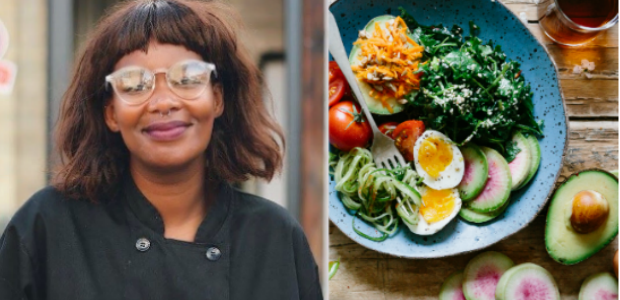In chef, food writer and food stylist Khanya Mzongwana’s world, good mood food goes beyond having a ‘treat yourself’ moment. She’s excited by the idea that what’s on your plate can have an effect on your mental wellbeing and it’s become the subject of her handbook that’s in the works called Smart Heart, Kind Mind; an inclusive look at food as self-care.
“I’m fascinated by how directly our brains (and stomachs) are affected by what we put into our bodies,” she says. “I’m usually smiling halfway through a bowl of pasta – for no reason!”
Where did the idea for Smart Heart, Kind Mind begin?
The idea for this book stems from my own personal struggles with mental illness and with food being such an integral part of my life. I figured making changes in the way I prepare and also eat food could be a helpful move. Also, I figured this is a topic that’s not being spoken about in an inclusive way.
Many people don’t have access to certain means of self-care; the whole self-care thing comes across as elitist/classist and only for a lucky, privileged few. With Smart Heart, Kind Mind, I would like the recipes and self-care methods offered in the book to be accessible to all people who need it the most, no matter what your gender, age, state of health or financial standing.
Any big learnings or revelations while researching for the book?
Recently I was placed back on antidepressants, and what I realised is that some foods that we deem “healthy” that may have been good for us can have adverse effects when combined with treatment, and that the gut is a great deal more sensitive than usual on this type of treatment and should be treated as such.
What are the staples of eating for self-care?
Remain hydrated at all times; a great deal of our bodies’ daily functions require water. Take care of your gut health by eating food rich in probiotics such as natural ferments. High fibre/wholewheat should feature in your diet but not too much because high fibre levels can cause damage to the stomach lining over time.
Preparing meals ahead is a helpful tool for people struggling to physically get up and prepare something for themselves. Keep healthy snacks around the house – mental illness can in many instances affect your desire to eat, and delicious, healthy, homemade pre-prepped snacks may just save your life. It’s also important to make the food you eat delicious, interesting and beautiful. Eating should be a wonderful ceremony no matter what your state of mind or health.
What do most people get wrong?
Many people indulge in unhealthy “comfort foods” which are high in fat, sugar and sodium because of how they’re feeling in the moment, which is detrimental for your overall health in the long run.
Is eating for body and eating for mind different?
It doesn’t have to be mutually exclusive. Putting the right things in your body with your mental health in mind will eventually have positive effects physically, with raised energy levels giving you the ‘gees’ to do some physical activity.
Look out for Khanya’s {Don’t} Panic Room at the FOOD XX Symposium on the 12th of February in Cape Town. She’ll also be speaking on a panel moderated by Ingrid Jones about womxn’s proverbial role in the kitchen.
What is FOOD XX?
FOOD XX is a platform and movement dedicated to empowering and celebrating womxn in the food and drinks industry. It was created in response to a need for a safe space to have difficult conversations, share, support and celebrate womxn in the industry. FOOD XX launches in February 2019 in the form of a symposium and an awards ceremony in partnership with Eat Out.
READ: 9 Reasons why you should buy a ticket to FOOD XX this February

